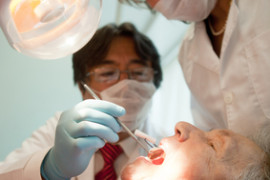Traditional clinical parameters of periodontal disease are associated with the development of lung cancer, according to new research published in the Journal of Experimental Oncology.
For the study, researchers performed an oral examination on 200 subjects, some of which had varying forms of lung cancer, who had not received periodontal treatments within the previous six months. They found that deep periodontal pockets, bleeding on probing, and clinical attachment loss were all associated with an increased risk for lung cancer after adjusting for confounding factors like smoking and socioeconomic status.
The study authors noted that previous research has shown that fewer teeth was associated with increased lung cancer risk. Researchers are not sure whether this relationship is causal or whether it is because lung cancer and periodontal disease have similar confounding factors.
The oral microbiome’s impact on the body’s immune response does appear to play a role in the development and progression of cancer. It will be interesting to see whether future research demonstrates an association between specific periodontal pathogens and lung cancer, as these pathogens have previously been linked to orodigestive cancers, colorectal cancer, and breast cancer.
Though the outcome of this study was far from conclusive, it shows that there is certainly a reason to continue studying the merits of this association.



